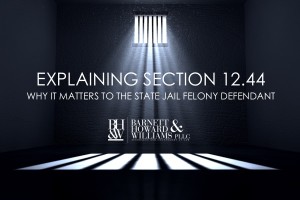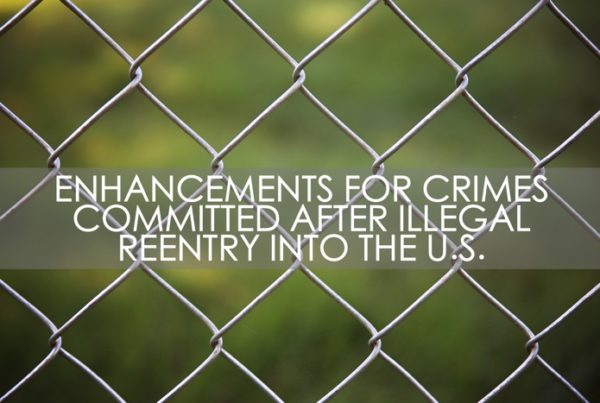What is Section 12.44(a) and Why Does it Matter to the State Jail Felony Defendant?
 Our Fort Worth criminal defense attorneys are routinely asked by family and friends of clients charged with State Jail Felony offenses about 12.44(a) and 12.44(b). Although it is sometimes elusive, our attorneys have had success in reducing State Jail Felony cases under Section 12.44. This article will discuss Sections 12.44(a) and 12.44(b) of the Texas Penal Code and explain why they are important to the State Jail Felony defendant.
Our Fort Worth criminal defense attorneys are routinely asked by family and friends of clients charged with State Jail Felony offenses about 12.44(a) and 12.44(b). Although it is sometimes elusive, our attorneys have had success in reducing State Jail Felony cases under Section 12.44. This article will discuss Sections 12.44(a) and 12.44(b) of the Texas Penal Code and explain why they are important to the State Jail Felony defendant.
State Jail Felony Punishment in Texas
In accordance with Section 12.35 of the Texas Penal Code, the confinement range for a State Jail Felony in Texas:
- From 180 days to 2 years in a State Jail facility.
Any resulting conviction under Section 12.35 is considered a felony conviction for most purposes.
When a person is sentenced to confinement for a State Jail Felony offense, the sentence is served day for day. Aside from State Jail Diligent Participation Credit, a state jail sentence will last for every single day of the term, unlike a prison sentence, which may be cut short for parole or good time. For example, if someone receives a sentence for 12 months in state jail, that person will serve 365 actual days on the sentence.
What about 12.44?
Since parole and good time are not options for state jail time, Section 12.35 requires the defendant to serve that sentence day for day. However, section 12.44 of the Texas Penal Code allows for a reduction of the above consequences for someone charged with a state jail felony.
Sec. 12.44. REDUCTION OF STATE JAIL FELONY PUNISHMENT TO MISDEMEANOR PUNISHMENT.
(a) A court may punish a defendant who is convicted of a state jail felony by imposing the confinement permissible as punishment for a Class A misdemeanor if, after considering the gravity and circumstances of the felony committed and the history, character, and rehabilitative needs of the defendant, the court finds that such punishment would best serve the ends of justice.
(b) At the request of the prosecuting attorney, the court may authorize the prosecuting attorney to prosecute a state jail felony as a Class A misdemeanor.
Please note section 12.44 has two subsections. The differences between them are significant.
What is the Difference Between 12.44(a) and 12.44(b)?
12.44(a)
Under 12.44(a), at the discretion of the court, a state jail felony can be punished as a Class A misdemeanor. If convicted, the conviction results in a felony conviction. However, if sentenced to confinement, the defendant is allowed to serve time the same as if he were convicted of a Class A misdemeanor. That means the defendant can serve his time in the local county jail as opposed to a State Jail facility. That also may allow the defendant to have access to good time offered by the county jail in his jurisdiction (e.g. In Tarrant County, this could result in 2 for 1 credit or 3 for 1 if the defendant is a trustee).
12.44(b)
Under 12.44(b), at the discretion of the prosecutor, a state jail felony can be converted to a Class A misdemeanor. If convicted, the conviction results in a misdemeanor conviction. If incarcerated, the defendant would serve his time in the county jail the same as described in the above paragraph.
Note: Both 12.44(a) and (b) require the sentence to be within the penalty range of a Class A misdemeanor (0-365 days confinement and a fine, if any, not to exceed $4,000).
Probation Under 12.44
Straight Probation and Deferred Adjudication probation are also allowed under both 12.44(a) and 12.44(b). Straight probation would result in a conviction for a felony if reduced under 12.44(a) and a conviction for a misdemeanor if reduced under 12.44(b). If you receive deferred adjudication probation under either a 12.44(a) or 12.44(b) reduction, a conviction can be avoided altogether if the probation is successfully completed. Any future probation revocation proceedings by the state would be limited at sentencing to the misdemeanor punishment provided by section 12.44 as discussed in the paragraphs above.
Note: A probated sentence under 12.44 cannot exceed 2 years – the maximum time allowed for a probated sentence for a Class A misdemeanor.
State Jail Felony Defense Attorneys, Fort Worth, Texas
Depending on the circumstances, if you or someone you know is charged with a state jail felony in Texas, Section 12.44 may be applicable. There are many factors that the prosecutor or judge will consider if your attorney requests a 12.44 reduction. It is important to discuss your specific circumstances with your attorney. Please feel free to contact Barnett Howard & Williams PLLC if you have questions.










